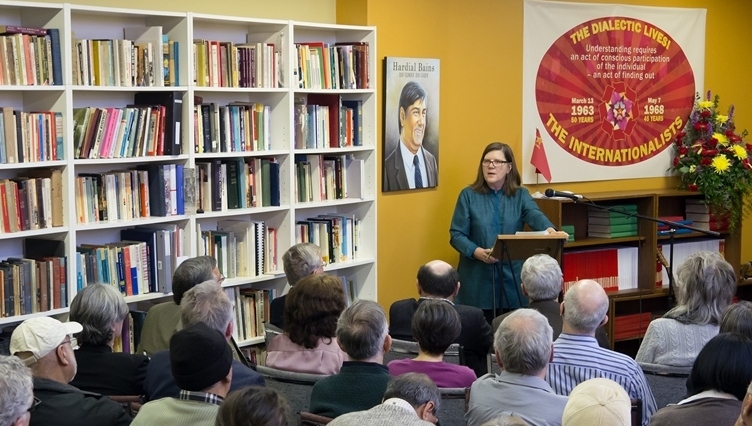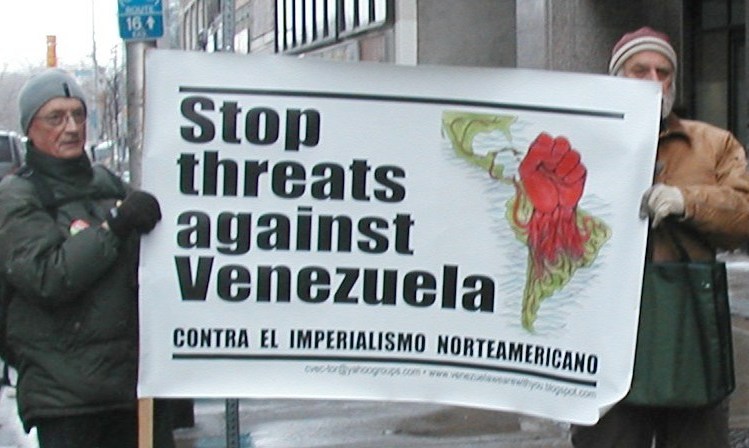
|
March 14, 2015 - No. 11 52nd
Anniversary of The Internationalists The Significance of the Founding of
|
 |
"The
past
only
has
beauty
if
it
exists
in
the
form
of
the
present
and
the
revolution
only
has
relevance
if
it
finds
its
adherents
from
one
generation
to
the
next."
- Hardial Bains |
Fifty two years ago, on March 13, 1963, the organization The Internationalists was founded on the campus of the University of British Columbia. The Communist Party of Canada (Marxist-Leninist) traces its origins to that day and it has carried on its work without interruption since that time.
The Internationalists was the most important organization of the sixties in Canada dedicated to the victory of the anti-imperialist socialist revolution. It took up revolutionary organizing as a practical task, which means that at each step it presented itself with the concrete tasks which required a solution in the immediate sense.
It established its program on the basis of the conditions of the time and involved everyone in working the program out and carrying it out in real life. The Internationalists knew precisely what needed to be done in the 1962-63 period and, as it turned its words into deeds, it worked out its further program. The Internationalists was conscious of where it wanted the people to go in the ultimate sense, that is, to socialism, and every step was set with this aim in mind. CPC(M-L) has carried on its work in the same fashion. This is one of the features the Party inherited from The Internationalists.
Another was to draw its membership from amongst those who are active in the movement by making appeals to the broad sections of the people, involving them in work and encouraging the best elements to join.
For The Internationalists, ideology and theory were also a matter of practice. They rejected the dogmatic rendering of life itself and, on the contrary, analyzed the conditions and provided guides to action to move things forward and contribute to the creation of a new society. As a result, The Internationalists and CPC(M-L) later on were able to cope with the theoretical and ideological needs of the movement in the course of the most difficult and complicated situations. To this day, this way of doing things provides CPC(M-L) with theory as a guide to action while its outlook is broad, vibrant and forward looking, capable of inspiring its members and supporters to achieve new heights.
The Internationalists were later reorganized in 1968 as a Marxist-Leninist youth and student movement and they founded the Communist Party of Canada (Marxist-Leninist) in 1970 as the vanguard of the working class on the theoretical basis of Marxism-Leninism. It is because CPC(M-L) draws its character from The Internationalists that it is an active organization which militantly deals with the problems of organizing to open society's path to progress within the present conditions of the retreat of revolution. CPC(M-L) is marching ahead with its practical work according to the general line for the period, in spite of the pressure exerted by attempts of the bourgeoisie to disinform and destroy everything.
On the occasion of the 52nd anniversary of The Internationalists, TML Weekly pays its deepest respects to its founder Comrade Hardial Bains and profound appreciation for its everlasting contribution to Canadian political life. TML Weekly greets those who joined the revolutionary work in 1963 and are still active with the Party, as well as all its fellow-travellers. The work started by The Internationalists more than five decades ago carries on and will continue to do so as the new society is brought into being in the historic struggle to end the Old and bring in the New.
In the Words of Hardial Bains
Writing about The Internationalists in the Author's Note to the book Communism: 1945-1991, Comrade Bains explained:
 Hardial Bains in front of International House at the University of British Columbia, 1962. The meeting to found The Internationalists took place here March 13, 1963. |
"Our organization, The Internationalists, became the well-known focal point of attraction at the time of its founding [on March 13, 1963] at the University of British Columbia in Vancouver. A broad organization, it was supported in various ways by many faculty members and several hundred students. It had no ideology when it started but reflected the frustration felt by the intellectuals at that time and the discontent of the working people with the existing conditions. More importantly, it brought people together who were advanced and the champions of enlightenment; those who wanted to change the situation. This organization started out as a discussion group, with the explicit aim of responding to the situation in which there was no academic atmosphere on the campus. There was a kind of anti-consciousness, a rigid opinion against inquiring into the subject matter, and the putting forward of views which had no basis in life and were detrimental to the progress of society. It can be seen that this organization had a limited aim and a modest beginning. There were no big or small phrases taken from books, no ideology supervising every action and no demonstrative actions, no guns and bombs, meant to impress the whole world. In fact, the ideology, politics and culture of this organization began to take shape with its subsequent work. Its ideology, political line, organization and culture became strong in the course of its development.
"This is not to say that the people involved in the organization had no ideology. I was a communist with a history of political activism which dated back to the late forties, while most of the others were left-leaning in one way or another, even though suspicious of communism. What bound us together was our concern about the existing conditions, the education and culture, and our rejection of the aim of the society, its motive for living. It was our immediate distaste for and opposition to what was being done to the working people in general, the working class in particular, Native people and immigrants, and to the peoples and nations internationally. With these ideas in embryonic form and with the work of our organization, our ideology began to take shape.
"It can be said with a lot of pride that this
organization came out of the
conditions of the sixties, had a mass character, and had no
preconceived
notions at its founding. It flourished on the rich soil of the working
people's
enthusiasm for change, and it was to corroborate the same conclusions
Karl
Marx had reached one century before. This was done not by reading some
conclusions of Karl Marx and imposing them onto the situation in a
dogmatic
and religious way, but by using these conclusions as a guide to action,
building the organizational form with an aim consistent with the
conditions of
our time. These discoveries ensured our independence both as an
organization
and in terms of our thinking. This also became the key ingredient for
the
ability of the organization to find its bearings in any complex and
difficult
situation. Our ultimate aim was socialism and communism, which was
proclaimed to the world with the founding of the Marxist-Leninist
Communist
Party on March 31, 1970 in Montreal, Quebec, the existing Communist
Party
having betrayed this ultimate aim."
About the situation at that time, Comrade Bains wrote:
"The 1950s and part of the 1960s were periods of the
temporary revival
and expansion of capitalism. During that time, both the U.S. and the
Soviet
Union boasted about the superiority of their systems, while the entire
world
was held hostage by their politics. No country or political force could
push its
interests forward unless it had the sanction of one superpower or the
other.
The bipolar division of the world became a fact. Revolutionaries had to
be
extremely vigilant not to become tools of one or the other superpower,
just as
today the communists must ensure they do not succumb to the pressure
which
advocates the unity of all nations with the U.S. as the gendarme. In
the
1950s
and 1960s, it required immense courage and deep convictions to stand
and
fight for the noble ideal of peace, freedom and the well-being of the
working
peoples and for an end to the exploitation of persons by persons. The
same is
again the case today."

Demonstration at UBC, October 24, 1962, during the Cuban Missile Crisis, a few months
before the founding of The Internationalists.
Comrade Bains pointed out that "Every epoch has the material which constitutes the building blocks of the new, but its construction cannot take place in a mechanical way. The struggle between the old and the new, between what is passing away and what is coming into being, erupts in each epoch, with definite class forces taking sides. Irrespective of their will, classes act in a specific way. For capitalism and imperialism to continue, the capitalists and the imperialists must ensure that the new class, the proletariat, and all the exploited, are left without the leadership, consciousness and organization they require to put an end to the systems which cause them such suffering. They need to provide the working class with aims which go against its interests, nationally and internationally. The aim provided to the working class and people of the imperialist heartlands, of ensuring their own prosperity to the detriment of the well-being of the peoples of Asia, Africa and Latin America, and at the expense of a growing polarization between rich and poor within the imperialist heartlands themselves, and of the natural environment, is extremely detrimental. The basis of this prosperity is the domination of the world, which has been pursued by splitting it on the basis of anticommunism. It has played a negative role and led to retrogression. It is still causing havoc in the ranks of the working people, especially in the working class movement. The capitalist governments and their official and unofficial agencies pay utmost attention to perpetuating the specter of communism, in order to introduce ideology and politics which paralyze the working people. The proletariat, the builder of socialism, and the other working people, the intellectuals, professionals, small farmers and fishers, trappers and small businessmen, and the oppressed, especially the women and the youth, must break loose from this vicious circle. They must take political stands in their own interests and organize consistently with the objective condition of their emancipation. Only then can they build the new society in this epoch. Such a society will emerge out of their political struggle for power, on the basis of which they must lead the entire society to provide solutions to the national and international problems which it faces and which face mankind.
"For the sake of emphasis, I reiterate that political work is the starting point of emancipation and the role of ideology is to serve it. It cannot be the other way around."
Further on he said: "...a new world can only be created by uniting around the politics of dealing with the problems of the day. These politics are the same as they were [in 1945]; the politics of pursuing the cause of peace, democracy and the well-being of the peoples. Utmost attention has to be paid towards the building of such unity. To say that no new world can exist so long as the working men and women are enslaved is a truism. The issue is that only socialism and its highest development, communism, are the condition, in both the objective and subjective sense, for the complete emancipation of the workers and oppressed peoples of all lands. The communists must not falter in terms of their responsibility to build such a unity. At the same time, they must carry out deep-going theoretical work in order to ensure that the lessons of the past period are brought home to the people. There is the necessity to build the organization of the working class and other working people and to ensure that communism is in the vanguard of society, not just in theory but also in practice. The communists must be seen by the working people as those who uphold the ideals of political unity and who strive to solve the problems on this basis."
"... Let us march forward on the path inspired by the dream of ending exploitation of persons by persons and the creation of a world in which the dream will itself be dwarfed by the reality of new human productive forces, released in the face of the unknown. Let there be no pessimism. Let the working people, the youth and women and the enlightened, march on to create a new world. Time is working in our favour. We must march on."
Hardial Bains, October 7, 1991
Important Events Across the Country
March 14 National Day of Action --
All Out to Defeat Bill C-51!
|
|
Photo Review -- International Women's Day 2015
International Women's Day was marked with militant actions across the country. Women boldly affirmed their place as leaders in the fight against the neo-liberal anti-social offensive and to defend the rights of all. Women and their organizations marched, discussed and exchanged their experiences in resisting the anti-social and anti-national austerity agenda being imposed by governments that refuse to defend the people's rights. They refused to accept any limitations in affirming their rights because every advance in women's rights is an advance for the entire society.
The spirit of these actions underscored that women are an organized force to be reckoned with, and that the Harper government, provincial governments and all others who refuse to defend the public interest, including the interests of women, will be held to account. This includes the unprecedented assault on rights through Bill C-51, the Anti-Terrorism Act, 2015, and the Harper government's incessant warmongering in the service of U.S. imperialist interests.
Halifax

The International Women's Day rally, organized by the Halifax-Dartmouth and District Labour Council, was held in the Grand Parade in central Halifax. The main theme was opposition to sexual violence against women, with particular reference to the over one thousand missing and murdered Indigenous women and the recent scandal at Dalhousie University's School of Dentistry involving male students posting sexually violent content about female classmates on Facebook.
Speakers also dealt with issues of working women. Janet Hazelton of the Nova Scotia Nurses' Union pointed to the provincial government's hostility toward health care unions. The Liberal government recently announced that services currently provided by the non-profit Victorian Order of Nurses will be opened up for tender. This is a de facto privatization of those services that will affect both nurses and home care workers, the majority of whom are women.
Quebec City

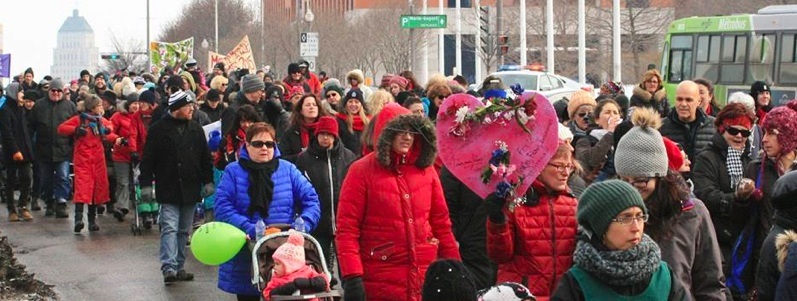
In Quebec City hundreds of women took to the streets continuing their fight against the dismantling of public services and the attacks of the Couillard government against the conditions of life of women workers.
Trois-Rivières


Hundreds of women rallied in Trois-Rivières outside the offices of Liberal MPP Jean-Denis Girard.
Montreal
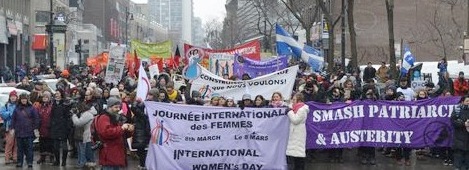
In Montreal close to 1,000 women took part in a
morning forum and a march through the streets of Montreal under the
banner
"Building the World We Want." Women of all ages and from all sectors
of
society active in organizations to defend their rights and in political
parties
marched with their banners and placards which illustrated that the
alternatives
to the anti-people policies of the governments at all levels exist in
the form of
the fight for the rights of all.

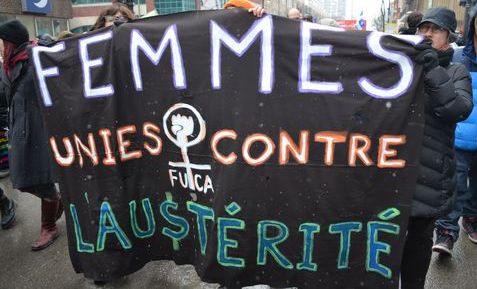










Women from the Haitian community in Montreal organized
an action to
denounce the crimes being committed against people of Haitian origin in
the
Dominican Republic.


Toronto
More than 1,000 women participated in the International Women's Day rally and march in Toronto. The rally was characterized by a spirit of resistance to the attacks being launched against women and the entire Canadian people by the Harper government and of determination to defeat the Harper government and turn things around. The speeches and slogans affirmed the right of the collective of women to a say in all aspects of their lives: over their bodies, their territories and their communities joining in the call of the World March of Women 2015. In particular the demand was made for a national inquiry and an end to the disappearances and murders of Indigenous women and an end to all gender-based violence. Women took a stand against the climate of fear being fomented by the Harper government, including through Bill C-51.
A contingent of striking teaching assistants at the
University of Toronto
participated, which is where the rally was held. Demands for a national
childcare program, for the rights of
refugees and for status for temporary foreign workers all had their
place in the
march. A large contingent of postal workers joined the march as it made
its
way
to Ryerson University, bringing their demand for an end to the attacks
on the
public postal service and the rights of the workers who provide them.
Edmonton

Close to 300 women and their allies celebrated International Women's Day on March 8 in Edmonton with a spirited march and forum. Women from all sectors of the economy came together to affirm their rights, including workers in health care, education, social services and other public services, postal workers and women in the trades including a strong contingent of carpenters. Migrante, which defends the rights of migrant workers, organized a militant contingent of women and men who work under the Temporary Foreign Worker Program, many in the fast food sector. The Alberta Federation of Labour and Edmonton and District Labour Council together with affiliated unions, the Alberta Union of Provincial Employees and Carpenters Local 1325 all participated with their flags and banners.
Much discussed was the Alberta Premier's recent arrogant statement that Albertans should "look in the mirror," to see who is to blame for Alberta's economic problems, claiming that the people have had it too good for too long. "We look in the mirror," emcee Peggy Morton stated, "and we see women against austerity. We see women saying no more missing and murdered aboriginal women! No more attacks on public services and the workers, mainly women who deliver them. We see women who are standing up for immigration not deportation and rights and status for all! We see women saying no to Bill C-51 and attacks on our civil rights, no to fearmongering and Islamophobia. We see women affirming that our rights as women, as workers, as human beings cannot be given or taken away by Prentice, Harper or anyone else."
The day's events were marked by the determination to
strengthen the fight
to defeat the Prentice/Harper austerity agenda which will impact women
most.
The spirit of standing as one permeated the day, no more so than when
speakers raised the demands of "No More Stolen Sisters!"; "Immigration
Not
Deportation!" and "No to Austerity!" The important contribution of
women to
the struggle against Canada's participation in wars of aggression and
attacks
on civil and political rights was also an important part of the day's
events.






Calgary
Vancouver
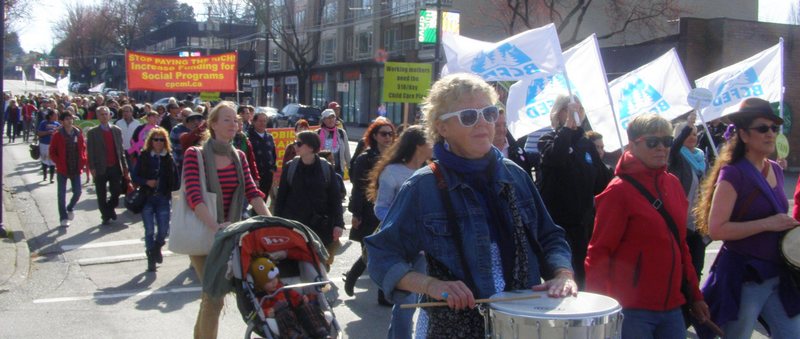

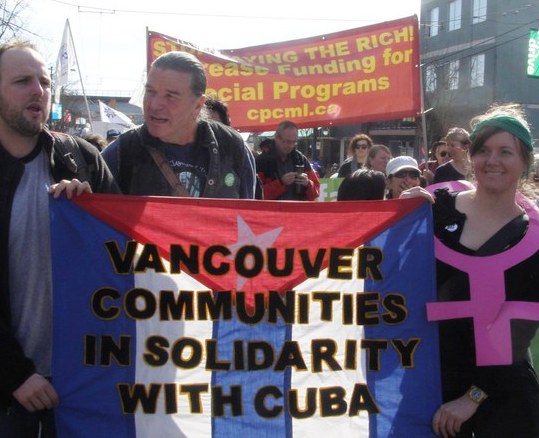
Actions in Defence of Venezuela's Sovereignty
and Right to
Be
|
Canadians from all walks of life are in action to reject the U.S. government's intensifying plans to undermine the democratically-elected government of Venezuela, under the bogus pretext of defending human rights and democratic freedoms. With utter shamelessness, the U.S. imperialists and monopoly media repeat bankrupt lies about Venezuela in the vain hope that they can fool the gullible. It is equally shameful that the Canadian government and MPs who posture as defenders of human rights are utterly silent on this fundamental violation of international law and human rights -- the right of the Venezuelan people to democratically decide their own affairs.
TML Weekly calls on everyone to continue the demonstrations, press conferences and public meetings to block this disinformation and defend Venezuela's sovereignty, the Venezuelan people and their Bolivarian Revolution.
Ottawa Panel Discussion on Democracy and Human Rights
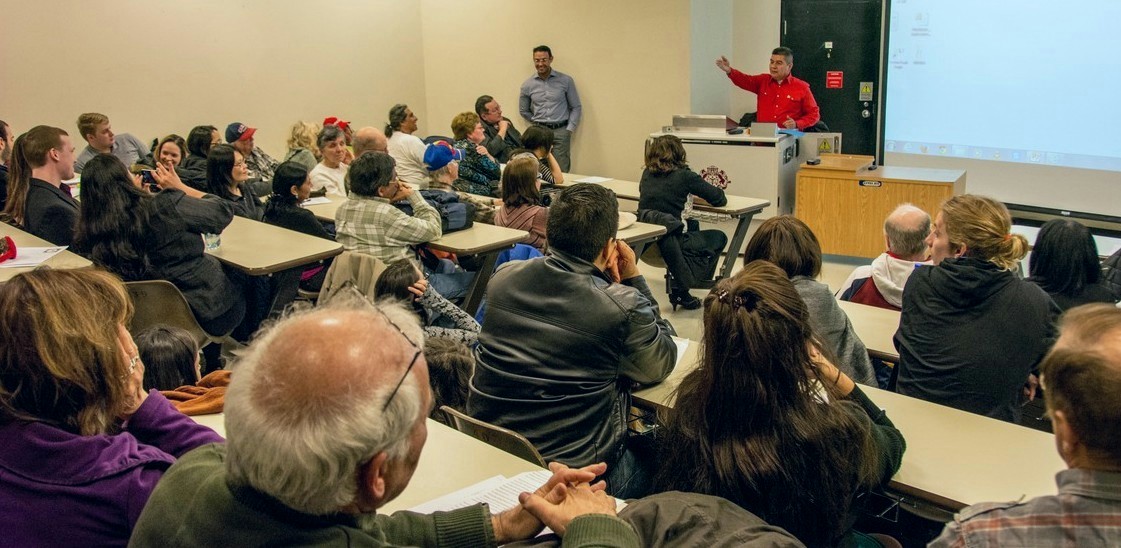
A panel discussion on democracy and human rights in Venezuela was held March 12 in Ottawa that featured Wilmer Omar Barrientos Fernández, Ambassador of the Bolivarian Republic of Venezuela to Canada and two other speakers. The event generated considerable interest and every seat was quickly filled. The program opened with a screening of the film "Carbon Copy: The Economic War in Venezuela," comparing the Venezuelan experience to the attacks on the Chilean economy before the U.S. backed coup on September 11, 1973.
 The first speaker was Dr.
George Sorger, a Venezuelan living in Canada
for many years and former McMaster University Professor of Biology. He
spoke about his childhood in Venezuela and the extreme poverty he
witnessed
around him; how malnutrition and lack of adequate housing led to a high
number of deaths of infants and children. Dr. Sorger spoke of the lack
of
opportunities for the vast majority of the population that lived in
extreme
poverty and how the Bolivarian Revolution has changed things for the
people
and given them pride of place in the country. He said that in the old
Venezuela the economy was simply seen as a way to make money and serve
U.S. interests rather than an instrument to provide for the people. He
explained
how the democratic institutions present in Venezuela have grown deep
roots.
Everyone is organized into neighbourhood councils to set priorities and
make
the decisions on health care, education and infrastructure to meet
their
needs.
The first speaker was Dr.
George Sorger, a Venezuelan living in Canada
for many years and former McMaster University Professor of Biology. He
spoke about his childhood in Venezuela and the extreme poverty he
witnessed
around him; how malnutrition and lack of adequate housing led to a high
number of deaths of infants and children. Dr. Sorger spoke of the lack
of
opportunities for the vast majority of the population that lived in
extreme
poverty and how the Bolivarian Revolution has changed things for the
people
and given them pride of place in the country. He said that in the old
Venezuela the economy was simply seen as a way to make money and serve
U.S. interests rather than an instrument to provide for the people. He
explained
how the democratic institutions present in Venezuela have grown deep
roots.
Everyone is organized into neighbourhood councils to set priorities and
make
the decisions on health care, education and infrastructure to meet
their
needs.
The next presentation by journalist Sam Heaton discussed how U.S. and Canadian intervention and coup attempts in Venezuela are justified on the basis of the Anglo-American imperialist definition of rights. The concept of rights promoted by the U.S. imperialists, Canada and the oligarchy is the one they imposed through the so-called Paris Charter in 1991 which declares that any country which does not have a market economy, human rights and elections of a kind which suit the U.S. is a pariah state and requires regime change. This was a declaration to oppose the countries which are building socialism which is the condition that guarantees people's rights and the aspiration of the Bolivarian Revolution. He pointed out that the requirement to have multi-party elections in order to be considered democratic is problematic for the U.S. because it props up dictatorships all around the world, while in Venezuela everything is done democratically and the U.S. does not like the results.
 What the U.S., Canada and
the Venezuelan oligarchy speak of is not
rights, but privileges, said Heaton. He pointed out that it is the
Venezuelan
government that upholds the rule of law, while the law is rejected by
anti-Bolivarian forces because it is not based on their former
privileges.
Claiming these privileges are their rights, U.S. aggression is aimed at
restoring
these privileges through nefarious means. Heaton also explained the
recent
history of Canadian intervention and undiplomatic activities in
Venezuela
including those of Canada's ambassador-designate, Ben Rowswell.
What the U.S., Canada and
the Venezuelan oligarchy speak of is not
rights, but privileges, said Heaton. He pointed out that it is the
Venezuelan
government that upholds the rule of law, while the law is rejected by
anti-Bolivarian forces because it is not based on their former
privileges.
Claiming these privileges are their rights, U.S. aggression is aimed at
restoring
these privileges through nefarious means. Heaton also explained the
recent
history of Canadian intervention and undiplomatic activities in
Venezuela
including those of Canada's ambassador-designate, Ben Rowswell.
The final presentation by Ambassador Wilmer Omar Barrientos Fernández consisted in part of an in-depth survey of the state of Venezuela and its progress in the social, economic, political and cultural spheres during the Bolivarian Revolution. He showed how the gains of the revolution are being attacked through economic warfare and presented evidence of widespread hoarding and attempts by the rich to sabotage the production and distribution of goods. He showed how for the first time in Venezuela's history the Bolivarian Revolution has invested oil revenue in health care and education and how the people have gained access to necessities previously available only to the upper classes. Ambassador Barrientos asked why these dozens of statistics are not spoken of in the media, which paint a desperate picture of the country. He invited people to go to Venezuela and see for themselves. It was pointed out that in the 1980s when oil prices collapsed the people had no support from the government and there were food riots and massacres. The difficult economic situation of Venezuela now with sabotage of the economy and the drop in world oil prices has not led to any hunger or food riots despite the scarcity of certain products. Despite the difficulties, he said, Venezuelans support the revolution and are determined to overcome.
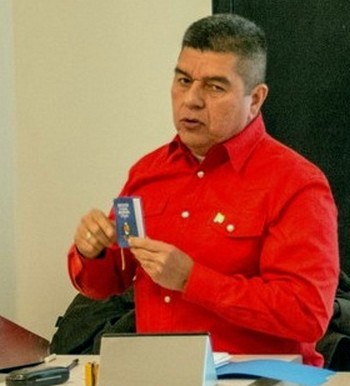 Ambassador Barrientos holds a copy of Venezuela's constitution. |
Ambassador Barrientos said he was glad that many Venezuelans had come to the event and that he was happy for the opportunity to discuss with them. He urged people not to fall prey to divisions. He pointed out that Venezuelans who are concerned for the future of their country should involve themselves in solving problems and contribute to building unity. He presented extensive evidence of disinformation and lies on the part of U.S.-backed forces involved in attempts to overthrow the democratically-elected government. He also refuted spurious claims made by opposition figures before the Canadian Parliament.
Ambassador Barrientos spoke of his working class upbringing and how one of the biggest difficulties in getting an education was lack of transport to the schools. He said this inspired him to open up educational opportunities for the poor and working class in Venezuela and millions of people are now attending university. The Ambassador also discussed his experience as a comrade-in-arms of the late President Hugo Chávez as far back as 1992 and how he and Chávez agreed to meet with opposition figures to prevent the country being split by U.S. imperialism.
The Ambassador presented evidence refuting the claims that unrest following the opposition defeat in the 2014 presidential election was a result of repression of peaceful protests. He said there should not be violence between Venezuelans and that this is not an acceptable response from a minority of the population in opposition to the democratic process.
A lively discussion followed the presentations with many people making a point to thank the Ambassador for his participation. A variety of questions and comments were made by participants, some rejecting the Ambassador's remarks and others asking for clarifications or more information. Ambassador Barrientos gave everyone the opportunity to state their positions and then systemically responded to each point or query.
Ottawa Demonstration Condemns U.S. Sanctions on Venezuela

The panel discussion followed a demonstration in Ottawa the preceding day. On March 11, demonstrators rallied and marched to condemn the U.S. sanctions against Venezuela announced on March 9 and to support the Bolivarian Revolution. The action began at the Prime Minister's Office, where people denounced Canada's meddling and support for questionable "opposition" figures in the country.
A Canadian from Venezuela thanked everyone for supporting his homeland and affirmed that U.S. aggression would not succeed in breaking the will or strength of Venezuelans.
The demonstrators chanted "Yankee, Go Home!"; "Stop the
Sanctions!";
"Hands Off Venezuela!" and took the decision to march from the Prime
Minister's Office to the U.S. embassy, pledging to return there on a
regular
basis as long as U.S. imperialism is threatening the Bolivarian
Republic of
Venezuela.


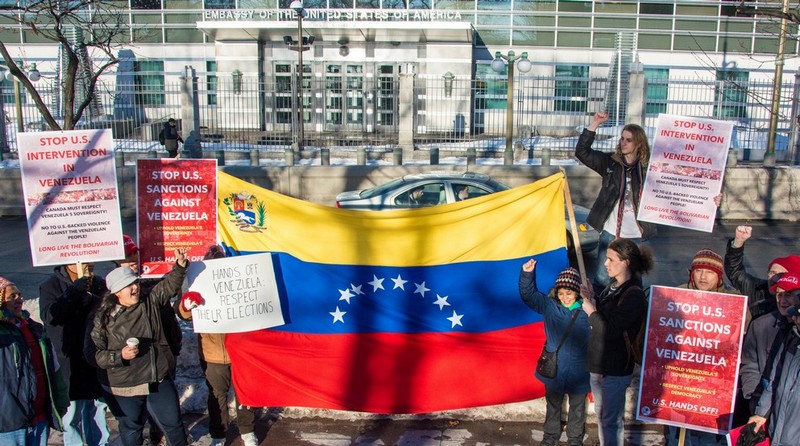
Press Conference at Simon Bolivar Cultural Centre in Montreal
On March 12, the Simon Bolivar Centre in Montreal hosted
a press conference where several speakers addressed the current
situation in
Venezuela, opposing U.S. aggression and the disinformation about what
is
taking place in the country.

Emergency Demonstration in Vancouver
More than one hundred demonstrators gathered on March 10 at the Vancouver Art Gallery to express their opposition to U.S. plans for intervention in Venezuela announced the previous day and to demand respect for the country's sovereignty.
Participants, many from other countries in the Americas, shouted in unison, "Yankee go home!"
"This is a threat to all our countries, not only for Venezuela. The U.S. government should respect the sovereignty of all countries," one participant pointed out.
"How is it possible that the U.S. government intends to sanction Venezuela for alleged human rights violations when they give their support to Mexico where students are killed and disappeared?" asked a young Mexican woman.
At the end of the activity, the organizers urged
everyone to remain vigilant
as events unfold in Venezuela and elsewhere in the Americas.
(With files from Venezuelan Consulate in Vancouver. Photos: TML, Venezuelan Embassy, HCPDF)
Cuba, Today & Tomorrow:
Exploring the Future of the Cuban Revolution
--
Cuban Ambassador Visits Halifax

H.E. Julio Garmendia Peña, Cuba's Ambassador to Canada, began a two day visit to Nova Scotia with a public meeting at Dalhousie University's Schulich School of Law on March 11.
 The Ambassador addressed a
large gathering of about 90 people on the
current challenges and developments facing Cuba, especially the meaning
of
the steps towards establishing full Cuba-U.S. diplomatic relations, and
the
further obstacles which lie in the way of the actual normalization of
relations
between the two countries. Following the presentation, the Ambassador
proceeded to answer wide-ranging questions for another hour.
The Ambassador addressed a
large gathering of about 90 people on the
current challenges and developments facing Cuba, especially the meaning
of
the steps towards establishing full Cuba-U.S. diplomatic relations, and
the
further obstacles which lie in the way of the actual normalization of
relations
between the two countries. Following the presentation, the Ambassador
proceeded to answer wide-ranging questions for another hour.
On this, his second visit to Halifax, the Ambassador laid special emphasis on the warm relations between the people of Nova Scotia and Cuba and the state of Canada-Cuba relations on the 70th anniversary of their establishment in 1945. The Ambassador also discussed the mass democratic consultations taking place throughout Cuba as the people shape ongoing economic measures aimed at updating the Cuban economic model in order to ensure a sustainable and prosperous socialist society into the future.
On March 12 he was interviewed on the CBC Morning Show. The Ambassador also met with Premier Stephen McNeil and Halifax Mayor Mike Savage.
People Reject Verdict on Police Killings in U.S.
Police Impunity Is a Crime, Not Something to Negotiate
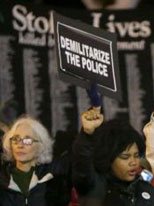
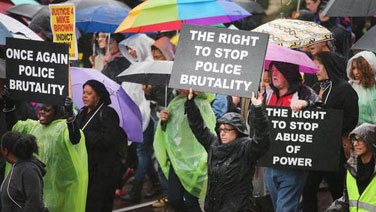
The U.S. Justice Department (DoJ) announced March 4 that it will not prosecute Darren Wilson, the policeman who killed unarmed African-American teenager Michael Brown in Ferguson, Missouri on August 9, 2014. This follows decisions by the local prosecutor not to indict Wilson. At the same time the DoJ issued a report providing clear evidence of systemic racism by the Ferguson police department. Evidently, there is to be no connection between this systemic racism and Wilson's claim that he feared for his life when confronted by an unarmed African-American teenager.
When it comes to police killings, federal charges require Justice Department prosecutors to prove that the individual policeman knowingly and deliberately violated the constitutionally protected civil rights of the person killed or brutalized during the shootings or beatings. This commonly means proving "unreasonable" use of force and that the person killed was targeted on a racist basis.
 The DoJ refers to this as a
"high bar" for prosecuting and uses that as the
excuse to permit police brutality and killings of African Americans,
Latinos
and youth generally all across the country. More youth have been killed
by
police since the killing of Brown, including an unarmed 12-year
old and a 19-year old, killed in his home in Madison, Wisconsin March
6. As these
many
killings indicate, the youth and national minorities experience the
very low threshold
for police to justify use of force. Wilson, and police generally,
merely have to
say they feared for their lives. No one is to question that this fear
is part of
the racist and militarist culture promoted, where simply being a Black
male
means you are a threat.
The DoJ refers to this as a
"high bar" for prosecuting and uses that as the
excuse to permit police brutality and killings of African Americans,
Latinos
and youth generally all across the country. More youth have been killed
by
police since the killing of Brown, including an unarmed 12-year
old and a 19-year old, killed in his home in Madison, Wisconsin March
6. As these
many
killings indicate, the youth and national minorities experience the
very low threshold
for police to justify use of force. Wilson, and police generally,
merely have to
say they feared for their lives. No one is to question that this fear
is part of
the racist and militarist culture promoted, where simply being a Black
male
means you are a threat.
Wilson, armed to the teeth and having protective gear, including a police car and back up on the way, fired 12 times at an unarmed teenager standing a good distance away from him. He clearly had other options. He was not required to use them. He was not required to face trial, as anyone else who shot and killed an unarmed person would be. Indeed, firing 12 times would likely be seen as malicious intent and thus first-degree murder. But unlike civilians, police do not have to prove the threat was real. Rather they just need to have a "reasonable" fear.
It is this unjust double standard and widespread and documented racism of the state, from the top down, that people are demanding be addressed. It is reflected in the stand "Black Lives Matter" and ongoing protests in Ferguson and across the country. It is a crime that the DoJ continues to sanction such impunity and state racism. The DoJ needs to be held as accountable as the police departments and the individuals doing the shooting.
 These killings are part and
parcel of the military culture spread among
local police by the DoJ and Pentagon. This includes the military
pre-emptive
shoot-to-kill approach and branding youth as enemies. Can it be an
accident that
President Obama labels all male youth 15-35 as "combatants" and police
see
African-American and Latino youth as a "threat" to their lives?!
These killings are part and
parcel of the military culture spread among
local police by the DoJ and Pentagon. This includes the military
pre-emptive
shoot-to-kill approach and branding youth as enemies. Can it be an
accident that
President Obama labels all male youth 15-35 as "combatants" and police
see
African-American and Latino youth as a "threat" to their lives?!
The DoJ report on Ferguson brought out that in 88 per cent of the cases where Ferguson police actually documented a use of force, it was used against African Americans. All examples of police dog bites involved African Americans. The report shows that minor traffic infractions were used to criminalize, fine and jail African Americans. From 2011 to 2013, for instance, African Americans accounted for 95 per cent of individuals charged with a "manner of walking in roadway" offense and 94 per cent of all "failure to comply" charges.
In response to this systemic racism, the DoJ will now negotiate with the Ferguson police department to "improve" the situation. The recommendations, as always, include better training and supervision and "improving tactics" for handling situations. Such a DoJ negotiated "understanding" already exists in Cleveland, where twelve-year-old unarmed Tamir Rice was killed by police within two seconds of their arriving on the scene. One exists in Los Angles as well, which did not stop the March 1 killing of an African-American man.
The racist militarist culture and treatment of national minorities and youth as criminals and a threat cannot be negotiated away. The problem is one of state-organized racism and state-sanctioned impunity to kill, brutalize and torture unarmed civilians. The role of the DoJ and Pentagon is criminal and they are the ones, first and foremost to be held accountable. This can be seen not only in refusal to prosecute police killings, but refusal to take immediate action in the face of clear evidence of torture and detention without charges by police in Chicago at the Homan Square black site.
As demonstrations and actions of various kinds continue, defending the rights of all while targeting the federal government and police agencies at all levels for their crimes is the way forward.
Voice of Revolution is a publication of the U.S. Marxist-Leninist Organization.
Untenable Position of Justice Department Regarding Ferguson Police Killing of Black Youth
As expected by people across the country with long experience of Justice Department investigations, Attorney General Eric Holder announced on March 4 that there will be no indictment of Darren Wilson, the policeman who killed unarmed teenager Michael Brown in Ferguson. "The facts do not support the filing of criminal charges against Officer Darren Wilson in this case," Holder said. "Michael Brown's death, while a tragedy, did not involve prosecutable conduct on behalf of Officer Wilson."
According to the report, Wilson's claim that Brown "appeared to pose a threat" was valid. It also states, "There is no credible evidence that Wilson willfully shot Brown as he was attempting to surrender or was otherwise not posing a threat." Federal investigators, like the local prosecutor, discounted as unreliable eyewitness statements that Brown was not a threat at the time he was killed.
 Evidently, being an unarmed young
man standing more than 130 feet away
(more than 40 yards, as documented by experts) is still a threat to an
armed,
trained policeman with backup on the way. Even if the false distance
of 35 feet given by
police is used, it is certainly enough distance for Wilson
to have
not used force at all. Instead, the DoJ report essentially states
Wilson's version
of events, including his "reasonable fear for his life," was valid. And
his
confrontation with Brown and firing 12 times in the space of two
minutes,
was
not unreasonable use of force.
Evidently, being an unarmed young
man standing more than 130 feet away
(more than 40 yards, as documented by experts) is still a threat to an
armed,
trained policeman with backup on the way. Even if the false distance
of 35 feet given by
police is used, it is certainly enough distance for Wilson
to have
not used force at all. Instead, the DoJ report essentially states
Wilson's version
of events, including his "reasonable fear for his life," was valid. And
his
confrontation with Brown and firing 12 times in the space of two
minutes,
was
not unreasonable use of force.
Holder also announced that the DoJ investigation of the Ferguson police department showed a "pattern of discriminatory behavior." Numerous facts and examples were given, showing the systemic racist character of the police department.
From 2012 to 2014, 93 per cent of the people arrested were black. In 88 per cent of the cases where Ferguson police documented a use of force, it was used against African Americans. Ferguson police overwhelmingly charged African Americans with petty offences, with fines of hundreds of dollars used to secure 20 per cent of the town's budget.
It is significant that Holder has also said he is prepared to dismantle the Ferguson police department. Ferguson Police Chief Thomas Jackson resigned on March 11, becoming the sixth employee to resign or be fired following the release of the DoJ's report, news agencies report. This is an indication that the findings of the report are going to be used not to eliminate state-organized racism and violence, but rather as justification for federal takeover of local police. As the federal government moves to bring local and state police under federal control, reports of the kind issued about Ferguson provide justification for such takeovers. Already, through various means like FBI Joint Terrorism Task Forces, joint federal/local immigration enforcement, and joint police live-exercises at demonstrations, like those against NATO and the G-20, the federal government is integrating local, county and state police under its command. State takeovers are no solution. They serve only to further militarize policing and eliminate the public, especially at the local level, from governance.
(Voice of Revolution)
Recent Police Killings in U.S.
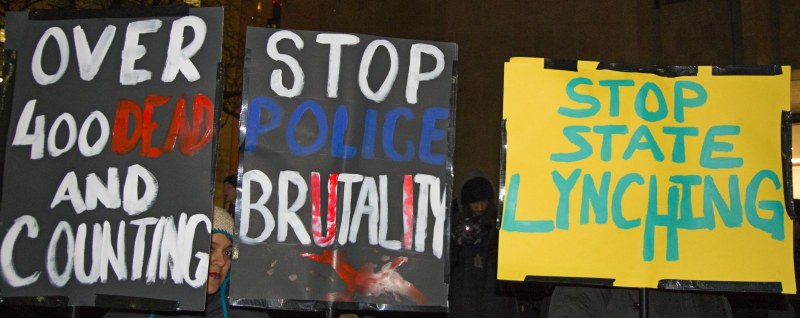
An unarmed black man who was found walking naked outside an Atlanta, Georgia-area apartment complex was fatally shot by a local police officer, DeKalb County Chief of Police Cedric Alexander said at a news conference on March 9.
The man, identified as Anthony Hill, 27, was shot by a police officer who had allegedly responded to calls about a man acting "deranged," knocking on doors and running naked. Hill's activities were corroborated by an amateur video of Hill posted on social media.
A man identified as Hill appears in the video completely naked and without any type of weapon.
According to Chief Alexander, an officer on the scene saw Hill in the parking lot area and said Hill ran toward him. "The officer called for him to stop, while running backwards, drew his weapon and fired two shots," Alexander said.
Witnesses and Hill's girlfriend contested the claim that Hill posed a threat, saying the man was clearly unarmed and had his hands up as he moved toward the police officer.
Authorities said they then tried to provide aid to Hill, who was shot in the chest, but he died at the scene. Alexander also said the officer who shot Hill is a seven-year veteran of the department and is white.
The case, which has been turned over to the Georgia Bureau of Investigation, adds to a series of similar incidents of white police officers killing unarmed black men over the past year in the United States. Black people in the U.S. are far more likely to be fired upon, arrested and imprisoned by police than any other demographic. These events -- including the killing of Eric Garner in New York and Michael Brown in Ferguson, Missouri -- as well as police impunity and the profoundly racist and discriminatory system of policing in the U.S. continue to be met with outrage across the country.
In just the past five weeks, at least five people have been killed or gravely injured by police in the United States:
January 26, 2015: Jessie Hernandez, 17, fatally shot 18 times by Denver police while sitting in a car.
February 4, 2015: Yuvette Henderson, 38, mother of two, fatally shot seven times by Emeryville police.
February 6, 2015: Sureshbhai Patel, 57, Indian grandfather, partially paralyzed by Madison police after a neighbour mistook him for a "skinny black man."
February 10, 2015:
Antonio Zambrano-Montes, 35, fatally shot
12 times with his hands in the air by Pasco police.
March 1, 2015: Africa, a man living on Skid Row in Los Angeles, fatally shot at least five times by Los Angeles police.
(TeleSUR, ColorofChange.org)
Chicago's Homan Square "Black Site" Police Facility

Protest outside Homan Square black site facility, February 28, 2015.
A recent series of articles in Britain's Guardian newspaper detailed abuses at the Homan Square facility in Chicago, the site of special police units and interrogations. While torture and police brutality are common in Chicago and elsewhere, Homan Square is notable as an "off the books" black site where those arrested can be "disappeared" and such activities can be carried out with greater secrecy and impunity. At Homan Square, detention without charges is common. Holding people for hours and days, handcuffed in painful positions, then releasing them without charges is also common. The majority of those targeted are African Americans and Latinos, as well as political activists.
Among the examples highlighted by the Guardian were those of anti-NATO protesters. In May 2012, protestors from across the country gathered in Chicago to oppose the NATO summit and stand against U.S. wars. Twelve individuals were arrested. Instead of being taken to a police precinct, they were taken to Homan Square. One of those arrested told how, instead of being charged and getting his right to call a lawyer, he was photographed for a "biometrics database" and taken to a cage, where he was handcuffed to a bench.
 He was not read his
Miranda rights before being interrogated in what
was mainly a fishing expedition to target other protesters. He spent 17
hours
handcuffed and shackled in a windowless cage before his lawyer was able
to
locate him. Another protestor arrested that same night said an officer
told her
she was going to, "Get a tour in hell at Homan," before she, too, would
be
handcuffed and shackled for 18 hours. It would be several hours before
both
of them were driven to an actual precinct where they were officially
booked
and released.
He was not read his
Miranda rights before being interrogated in what
was mainly a fishing expedition to target other protesters. He spent 17
hours
handcuffed and shackled in a windowless cage before his lawyer was able
to
locate him. Another protestor arrested that same night said an officer
told her
she was going to, "Get a tour in hell at Homan," before she, too, would
be
handcuffed and shackled for 18 hours. It would be several hours before
both
of them were driven to an actual precinct where they were officially
booked
and released.
Chicago attorneys report clients being beaten in the facility. One attorney only found her client after he was admitted to a hospital with a head injury. A 15-year-old was held for more than 12 hours until his attorney, who was never allowed to see him, showed up at the facility. Defendants are routinely taken there without any record of a transfer. It is not until their arrival at a separate police precinct that they are allowed to speak with attorneys. Lawyers spend hours searching, being told there is no record of their clients, sometimes only finding them after they are released from Homan with no explanation. There is a report of one person who died in the facility with no one knowing he had ever been taken there until after he was dead.
There have been demonstrations demanding Homan Square be shut down. Since the series of articles appeared in the Guardian, calls for an investigation have increased. The American Civil Liberties Union and the National Association for the Advancement of Colored People have said they are doing their own investigations and plan on taking action. Amnesty International published a letter to Mayor Rahm Emanuel demanding an open and impartial investigation. It notes that many of the complaints are in violation of international laws concerning issues of torture, ill-treatment and forced disappearance.
We Charge Genocide, a "grassroots, inter-generational effort to center the voices and experiences of the young people most targeted by police violence in Chicago," is demanding reparations for all those tortured and abused. They have provided evidence and examples of the torture and abuse that occurred for years under former Commander Jon Burge from 1972-1991. They are adding the crimes at Homan to the scope of their work and stepping up their efforts to secure justice and reparations for all those tortured and abused by Chicago police.
Protests at Homan Square Demand It Be Shut Down and
Those
Responsible Held Accountable
 On March 1 hundreds of
people gathered outside Homan Square, chanting
slogans such as "Shut Down Homan Square" and "Indict, convict, send the
torturers to jail."
On March 1 hundreds of
people gathered outside Homan Square, chanting
slogans such as "Shut Down Homan Square" and "Indict, convict, send the
torturers to jail."
Later, dozens of protesters marched through nearby streets calling on people to come forward to report police abuse and violations of rights. Organizers are making an effort to gather evidence and plan actions to demand accountability.
Together protesters affirmed that the torture, detention
without charges
and police brutality will not stand.
Protesters demanded that anyone arrested in Chicago be "booked immediately upon arrest and given access to a phone with which they can call an attorney." They also demanded that posters informing people of their rights and the 800 number for free legal aid be placed at all Chicago Police Department facilities. Addressing the need for the public to be informed and that officials be held accountable, they also demanded a special meeting with Chicago police within 10 days, to "allow the public to ask questions of supervising Chicago Police Department (CPD) officers about what happens inside Homan Square and other facilities."
Another rally on March 5 called to "Shut the Torture House Down." Organizers stated, "We are outraged by the existence of the notorious Homan Square facility, where Chicago police illegally hold civilians, torture, intimidate and deny them their rights! We clearly understand that the Homan Square facility would not exist without the complicity and protection of Mayor Emanuel and Anita Alvarez, Illinois Cook County District Attorney. We demand Homan be shut down now!
"We cannot emphasize enough that this warehouse of police terror is not the only site where police violence and denial of due process take place. This is 'business as usual' in every Chicago Police Station, where it is predominantly members of African American and Latino communities who are tortured, abused, who never get access to a phone or legal representation."
Their demands to Mayor Rahm Emanuel included:
1. Close down Homan Square Warehouse immediately.
2. Fire Chicago Police Superintendent, Gary McCarthy.
2. Pass the Torture Reparations Ordinance.
3. Order the permanent display in ALL Chicago Police Stations, accessible to ALL detainees upon arrest, the services and 1-800-LAW-REP4 for First Defense Legal Aid, who offer free legal representation 24/7.
4. Issue an apology to the people of Chicago and all those who have been abused and tortured by CPD and for allowing Homan Square Police Warehouse to be used as a Chicago police torture chamber.
5. The immediate resignation of Cook County State's Attorney Anita Alvarez. The new U.S. Attorney General Loretta Lynch must immediately launch a full scale federal civil rights investigation of the Homan facility, and of the Chicago Alliance's 2014 complaint to her predecessor, Eric Holder, that documented murder, torture, abuse by Chicago/Chicagoland police officers.
(Voice of Revolution. Photos: The Dissenter, Chicago WCW)
The Fight in France Against Islamophobia
The New Secularism, a Discriminatory Principle to Promote the Clash of Civilizations
These are hard times for the Republic: multiplying attacks against Muslims and their places of worship, new measures to monitor and police the Internet and social networks, against a backdrop of the "war on terror." The farce of January 11 [the mass rally in Paris following the attack on Charlie Hebdo] used the display of a united front against Islamism to launch hostilities to prepare public opinion for tightened security measures, the destruction of freedoms, as well as all kinds of military adventures. With the attack against Charlie Hebdo occurring amidst a marked rise in Islamophobia in France and throughout Europe, it does not take much. Demonstrations against Islam continue to grow and some journalists and leading politicians do not hesitate to blame Islam directly for the economic and social problems affecting France.
"Secularism," the leitmotif of the discriminatory anti-Muslim speeches, is the spearhead of the modern day crusades. Islam is seen as a conquering and expanding religion, and is denounced as a direct threat to the "values of the Republic." Why this sudden concern, which marks a break with the policy of tolerance enjoyed by immigrants and their descendants for decades? The presence of Muslims in France is nothing new but has only been seen as a threat to religious neutrality since the early 2000s, precisely from the beginning of the "war on terror." Does the current aggressive and discriminatory defence of secularism serve a purpose other than maintaining the religious neutrality of the state? If we can answer this in the affirmative without hesitation, then what are these other aims?
The Case of the Islamic Headscarf (1989)
The spotlight was first turned on "the problem" of the veil with the 1989 case of the Islamic headscarf. Soon after the beginning of the school year, three students from Gabriel-Havez high school in Creil, located in a priority education zone, were expelled because they refused to remove their headscarves in class. The case quickly became a national issue and Education Minister Lionel Jospin requested an opinion from the Council of State, which offered a nuanced response on November 27, 1989: it reiterated the right of students to express religious beliefs in school but set limits on the display of religious symbols of an ostentatious or outspoken character. The same opinion was given in another judgment of the Council of State in November 1992, concerning an identical matter in Jean-Jaurès high school in Montfermeil, in which the Council imposed the reinstatement of those students excluded for wearing headscarves.
In its decision, the Council of State reiterated the principles of secularism, which oblige educational institutions to accept all students, regardless of their origin or religion, while simultaneously imposing a number of constraints on the exercise of their religious freedom:
"Students wearing symbols with which they intend to express their religious affiliation is not in itself incompatible with the principle of secularism, to the extent that it constitutes the exercise of freedom of expression and manifestation of religious beliefs, but that freedom does not allow students to wear religious symbols which, by their nature, the conditions under which they would be worn individually or collectively, or by their ostentatious or outspoken character would constitute an act of pressure, provocation, proselytism or propaganda, would undermine the dignity or freedom of the pupil or other members of the educational community, jeopardize their health or safety, disrupt the conduct of teaching activities and the educational role of teachers, or ultimately disturb order in the establishment or the normal operation of the public service." (Council of State judgement, November 27, 1989).
Essentially, the Council of State remains compliant with the principle of secularism as it appears in the law separating Church and State. The founding texts indeed define it as an obligation concerning school premises, curriculum and teachers, but not for the students as users of the school system. This is a legal principle in defence of freedom of individual expression and tolerance vis-à-vis religious practice that is consistent with the 1905 law that Article 9 of the European Convention on Human Rights reiterates:
"Everyone has the right to freedom of thought, conscience and religion; this right includes freedom to change his religion or belief and freedom, either alone or in community with others and in public or private, to manifest his religion or belief, in worship, teaching, practice and observance."
2003 Turning Point
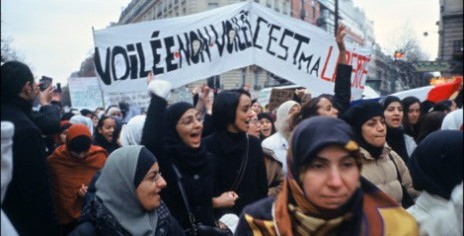
Demonstration in Paris, January 2004, against passage of law banning the wearing of "conspicuous" religious symbols by students in public educational institutions.
According to French sociologist Raphaël Liogier, the "great bifurcation" (the point at which Islamization began to be presented by policymakers as a major problem) took place in France in 2003, the year of the U.S. intervention in Iraq. At this time all the anti-Islamization associations such as Observatoire de l'islamisation, the Bloc Identitaire, Riposte Laïque, or even Ni Putes Ni Soumises, were born. It was also in 2003, at the request of then-Prime Minister Jean-Pierre Raffarin, that François Baroin submitted a report in which he proposed a new conception of secularism. Based on one of the conclusions of the commission, then-President Jacques Chirac spoke out in favour of a law banning the wearing of "conspicuous" religious symbols by students in public educational institutions. This law was passed on March 15, 2004 and came into force in September 2004. It would be followed by others, which contribute to the exclusion of visible signifiers of the Muslim religion in a growing number of public places.
The defence of a new secularism is presented in the Baroin Report as a necessary reaction against the development of communitarianism and fundamentalist action in order to defend the values of the Republic. Exit multiculturalism, enter "assimilationism":
"Secularism has indeed been gradually replaced in the left's pantheon of values by the defence of cultural differences and communitarianism. This trend is part of the promotion of human rights as the dominant value of the left. It results in a guilty conscience vis-à-vis France's colonial heritage and a need for atonement (theme of "repentance"). Freedom of expression and recognition of differences are privileged over other values such as the teacher's authority, the mission of educating and the emancipation of the individual."
This report considers the Islamic veil as more of an "attribute of the fundamentalists that is part of a model of society based on a ghetto logic and hostile to the values of democracy" than as a simple sign of religious affiliation. While making a distinction between Islam and Islamism, it advocates relying on integrated Muslims to fight against the threat of Islamization and the implantation in our country of a fundamentalist Islam that challenges the very principles of the organization of our society:
"This oppositional discourse must come from people of immigrant origin. The appointment of several ministers from their ranks was a first encouraging sign. It is up to the current majority to create real republican elites of immigrant origin in all areas (political, economic and social). It is a condition for regaining territories lost by the Republic."
The New Secularism, a Discriminatory Principle to
Promote
the Clash of Civilizations
By turning a legal principle into a "civilized value" and promoting a quasi-religious conception of secularism, this shift clears the way for all manner of Islamophobia. The religious practice of Muslims, a genuine collective phobia, is seen as both a sign of obscurantism and a problem threatening the national identity. The supporters of the headscarf ban rely on an emancipatory conception of education and a belittled vision of religious symbols as being opposed to progressivism and the science of the Enlightenment. As stated by Claude Gueant [former Chief of Staff to French President Nicolas Sarkozy], "all civilizations are not equal" and Islam, by its conquering nature, represents a threat to the Judeo-Christian West. Echoing this misguided conception of secularism, policies have been floated for the past 10 years based on a phantasm of Islamization, France's version of the neo-conservative theory of the clash of civilizations, as updated by [Conservative U.S. political scientist] Samuel Huntington. It provides several political opportunities: a scapegoat strategy and socio-ethnic discrimination, as well as justification of the Empire's wars against the Muslim world under the pretence of wiping out jihadism. This ideological shift, initiated by the right, is being pursued by the current government, which shows a remarkable continuity with the previous one in completing this transformation of the security apparatus.
As the new dominant ideology, neo-conservatism serves the interests of globalist elites to justify their warmongering projects. However, the vast majority have nothing to gain from a civil and/or military war against the Muslim world. Far from Islamization being the issue, the real threat is that of a confrontation with Islam modelled on the clash of civilizations. The rejection of the endless war on terror, that has been costly for both sides, is the only feasible way forward to revive a tolerant, peaceful and egalitarian conception of secularism and work for national reconciliation with the populations originating from post-colonial immigration.
Note
* The Council of State is a body of the French
national government that acts both as legal adviser of the
executive branch and as the supreme court for administrative
justice. Established in 1799 by Napoleon Bonaparte as a successor
to the King's Council (Conseil du Roi),
it
is
primarily
made
up
of
top-level
legal
officers.
The
Vice
President
of
the
Council
of
State
is
the
highest-ranking
civil servant in
France -TML Editor
(bourgoinblog.wordpress.com, January 22, 2015. Translated from original French by TML.)
U.S. President's Visit to India
India Joins U.S. Imperialist Schemes in Asia
U.S. President Barack Obama went to India for an official two-day visit, January 25 to 26, for the second round of U.S.-India talks in four months that are part of the U.S. pivot to Asia. This was Obama's second trip to India. He is the first U.S. President to visit India more than once.
Several issues were on the agenda during Obama's visit. Indian journalist Siddharth Varadarajan, a senior fellow at the Centre for Public Affairs and Critical Theory in New Delhi, highlighted some of the significant issues up for discussion in a January 24 item. These included "billions of dollars worth of nuclear reactor sales; the prospect of lucrative arms sales; and the possibility of an open door for U.S. companies looking for opportunities in the insurance, retail and services sector."
Regarding the sale of nuclear reactors, Varadarajan wrote that prior to the meeting nuclear commerce had been stagnant "because American companies like GE and Westinghouse -- which regard being sued for a nuclear accident as part of the risk of selling reactors inside the U.S. -- are unwilling to subject themselves to any claims for damages in the event of an accident in India. India's liability law is seen by them as an obstacle and the Obama administration has spent the past four years trying to get the Indian side to dilute its provisions."
Other issues discussed at the meeting included U.S. arms sales to India; a bilateral investment treaty; joint development and production of arms; bilateral security cooperation on counter-terrorism; regional cooperation "to advance peace, stability and prosperity" in the Asia Pacific and Indian Ocean regions; and cooperation on the "transformation of Afghanistan."
Varadarajan points out India's significance to U.S. strategic interests in its pivot to Asia:
"In his first few months, [Indian Prime Minister Narendra] Modi has enthusiastically embraced the idea of India teaming up with the U.S. and Japan, and also Australia. While in Tokyo last year, he criticized the 'expansionism' of certain unnamed countries and accused them of 'encroaching on the seas of others.' What Obama would like to do is to channel Modi's natural instincts into an institutional framework in the Asia-Pacific that harnesses India to the American pivot. [...]
"In case there was any ambiguity about whom the intended target of this trilateral was, the joint statement [at the previous summit] flagged 'rising tensions over maritime territorial disputes ... especially in the South China Sea' and 'urged the concerned parties to pursue resolution of their territorial and maritime disputes through all peaceful means, in accordance with universally recognized principles of international law.' This was the first time the disputed waters had ever been mentioned in a joint Indo-U.S. statement."
Also directly related to the U.S. pivot to Asia is arms
sales, joint war
games and interoperability of Indian and U.S. militaries. Varadarajan
writes,
"The U.S. has been moderately successful in developing India into a
consumer
for American military hardware. Russia is still a big supplier but the
U.S. has
made inroads that would have been considered unthinkable a decade ago.
The
U.S. has also upped the scope and scale of its exercises with the three
Indian
services. What remains elusive, however, is the holy grail of
inter-operability
-- the seamless use of Indian and U.S. military personnel and assets
that
requires not just the familiarity of working together, but also the use
of
compatible equipment by the Indian side and, most crucially, American
naval
and air access to Indian military facilities."

In this regard, Varadarajan pointed out in an item published after the summit:
"More than the 'breakthrough' on nuclear liability and their personal chemistry, Prime Minister Narendra Modi and US President Barack Obama's summit will be remembered for the fateful decision India took to join hands with the United States against China.
"In diplomacy, big shifts are often conveyed through words that are written, not spoken. The American policy of containment against the Soviet Union emerged from a long cable. India's decision to support that policy's modern variant -- this time with China as the object -- is writ large in the 'US-India Joint Strategic Vision for the Asia-Pacific and Indian Ocean Region' statement issued on January 25.
"Unprecedented in form and content, the document declares that 'a closer partnership between the US and India is indispensable to promoting peace, prosperity and stability' in the region. Prosperity, in turn, 'depends on security,' the statement says, mentioning in this context not Somalia and piracy, the Persian Gulf or the Malacca Straits but one and only hotspot: A maritime dispute involving China.
"'We affirm the importance of safeguarding maritime security and ensuring freedom of navigation and over flight throughout the region, especially in the South China Sea,' the document says. 'We call on all parties to avoid the threat or use of force and pursue resolution of territorial and maritime disputes through all peaceful means, in accordance with universally recognised principles of international law, including the United Nations Convention on the Law of the Sea.'
"To realise the significance of this reference to the South China Sea, we need only cast our mind back to June 1998, when Bill Clinton and his Chinese counterpart, Jiang Zemin, issued a 'Sino-US Presidential Joint Statement on South Asia'. The context was the nuclear tests by India and Pakistan but New Delhi bristled at its meddlesome language.
"Last September, when a reference to the South China Sea was included in a US-India statement for the first time, the Chinese foreign ministry said that any dispute 'should be worked out by sovereign countries directly concerned through friendly consultations and negotiations.' On January 26, the Chinese spokesperson added that 'countries out of the region' should 'respect efforts made by countries in the region to keep the serenity of the South China Sea.'
"Beijing's response is not surprising. The latest India-US reference to the South China Sea is embedded in a wider strategic initiative which fuses the Modi government's 'Act East' policy with the Obama administration's controversial 'pivot to Asia'. Their 'Strategic Vision' document commits them to 'promote the shared values that have made our countries great... In order to achieve this regional vision we will develop a roadmap that leverages our respective efforts to increase ties among Asian powers, enabling both our nations to better respond to diplomatic, economic and security challenges in the region.'
"The 'Asian powers' referred to are Australia and Japan, of course, a fact confirmed by US officials in a background briefing to the New York Times. According to these officials, the first 45 minutes of the Modi-Obama meeting was dominated by China. Modi, they revealed, 'suggested reviving a loose security network involving the US, India, Japan and Australia.' The last time this quadrilateral was convened -- way back in 2006 -- India's reluctance to get sucked in to an emerging Cold War in Asia led it to insist on limiting its interaction to one naval exercise and to junior official level meetings at the sidelines of larger Asean gatherings. The Quad was unceremoniously dissolved when Kevin Rudd became Australia's prime minister. Few tears were shed in Delhi at its timely demise.
"What we are seeing now is Modi committing India to work closely with the US, Japan and Australia in order to counter the challenges China poses to them. By any yardstick, this represents a major shift in Indian foreign policy."

(Sources: Huffington Post, Hindustan Times. Graphics: Brookings Institute; Times of India)
How to Guarantee Peace on the Korean Peninsula
The Need for a Well-Balanced Approach to Issues on Korean Peninsula and Northeast Asia
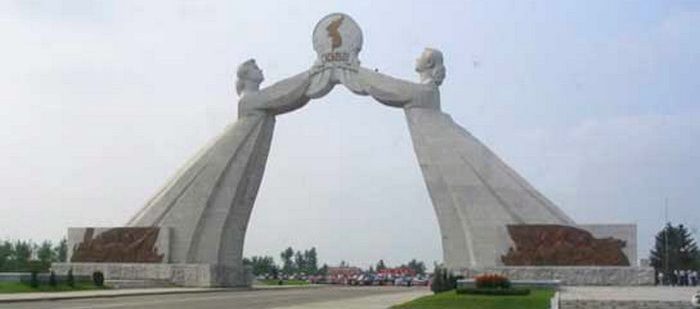
Reunification Arch, Pyongyang
Since World War II, the power structure of Northeast Asia has been compressed onto the Korean peninsula, where both the north and the south aspire for reunification. Within these circumstances, all neighbouring countries, which have political, military and economic interests on the peninsula, are deeply concerned about the reunification formula since it is directly connected with security and peace in Northeast Asia.
Danger of Korean Reunification Through Confrontation of Systems
The north and south of Korea have developed along different paths since the division of the country, maintaining different ideologies and political systems for almost 70 years. Neither of them wants to abandon its respective ideology and system although reunification is their common aspiration.
Within this stark reality, if one side tries to force its ideology and system on the other, it will bring about a war, threatening peace and stability in Northeast Asia. The geopolitical position of the Korean peninsula remains unchanged. The Korean peninsula is surrounded by big powers and on the peninsula their interests are intertwined. The geographical particularity of the Korean peninsula may either prevent or instigate conflicts among big powers. Confrontation and conflict between the two sides of Korea will inevitably invite big powers into the conflict and reconciliation and cooperation between the north and the south will promote the stability of the region, including among big powers, and check the outbreak of possible conflicts.
A north-south fratricidal war, caused by the confrontation of the two systems, may draw neighbouring countries into that fight, but on the other hand, the peacefully reunified peninsula could serve as a buffer zone that ameliorates strategic confrontation among neighbouring countries.
The new U.S. Asia-Pacific Strategy is aimed at the containment and control of other major powers and the Korean peninsula is considered the main stage for that strategy. To cope with U.S. moves, neighbouring countries strengthen their strategic countermeasures and expand their areas of cooperation.
This reality increases the dependence of the security of Northeast Asia on the reunification formula of the Korean peninsula. In 2012, the U.S. developed its new defence strategy and since then has annually dispatched an aircraft carrier fleet to conduct the U.S.-Japan-South Korea joint naval exercises in waters around the peninsula, accelerating preparations to establish a trilateral missile defence system. In response to the U.S. moves, Russia and China stage joint naval exercises around the peninsula and join efforts to counter U.S. attempts to establish a missile defence system in Asia.
Under these circumstances, the continuation of confrontational systems can only bring war to the Korean Peninsula, where no mechanism to prevent an armed conflict and war exists as the Armistice Agreement has been nullified. Such a war will continue until the winner is decided and fan the flames of strategic confrontation among neighbouring countries, so as to cause the complete destruction of a security balance in Northeast Asia and in the long run, an Armageddon in the region. If a war breaks out on the peninsula, it will be a clash of fire and nuclear weapons and its catastrophic aftermath will not compare to the 1950s Korean War or recent Middle East turmoil or the case in Ukraine.
In conclusion, reunification through a confrontation of systems is unrealistic and counter to the interests of both north and south Korea as well as neighbouring countries and might open a Pandora's Box that will destroy the long-term interests of the Korean nation and Northeast Asia.
The north and the south should refrain from absolutizing their own ideologies and systems and pursuing a confrontation of systems and instead realize national reunification peacefully and play a pivotal role in efforts to transform an unstable peace in Northeast Asia into a durable one.
Korean Reunification Through System Coexistence -- The Only Way
 As it is obvious that a
confrontation of systems will only bring about
a war, the peaceful way for Korean reunification is, of course, the
coexistence
of the systems of the north and the south.
As it is obvious that a
confrontation of systems will only bring about
a war, the peaceful way for Korean reunification is, of course, the
coexistence
of the systems of the north and the south.
Some believe that differences in the systems of north and south Korea might be a reason for them to be unable to coexist. However, this cannot be a reason. The differences in the systems are not an Achilles heel to reunification but an inevitable reason for the coexistence of the systems. This is proven by the fact that the Korean nation's aspiration for reunification has never weakened but grows stronger and stronger even though the different systems have been formed and consolidated in the north and south of Korea.
Two different systems, diverse political activities and various forms of ownership can coexist in a state. It has been proved in practice in other countries.
Both north and south Korea recognize that each has its own system. Therefore, if they respect each other, cooperation between the two sides will be easily realized and the achievement of reunification will not be a problem.
The north's proposal to reunify the country with the formula of maintaining two systems is not aimed at forcing its interests and system on the south, and bringing hardship and suffering to both. The north does not force its socialist system on the south and has never done so. However, this does not mean that the former would tolerate having the latter force its system on it either.
When reunification is promoted with the formula of two coexisting systems, neither side will need to gamble with their lives for reunification or sacrifice their interests.
On the contrary, they can butter both sides of their bread.
The reunification formula based on two coexisting systems is not aimed at imitating the unification experiences of other countries but at achieving reunification in line with the reality of the Korean peninsula. In other words, it is the formula agreeable to and already agreed to by the north and the south. If the north and the south, the key parties of reunification, fail to respect the spirit and articles agreed to by each other and try to copy the experiences of others and apply them to the Korean peninsula, it will be a naive attempt to build a Cloud Cuckoo Land.
The unification experiences and formulas of other countries may conform to the realities and conditions of those respective countries, but they will definitely not be suitable for the reality of the Korean peninsula.
On the road to reunification, the north and the south
have already agreed
on a charter and program for reunification, such as the Three
Principles of
National Reunification, the historic June 15 Joint Declaration and the
October
4 Declaration, thus demonstrating to the whole world the nation's
mettle and
determination to reunify the country.
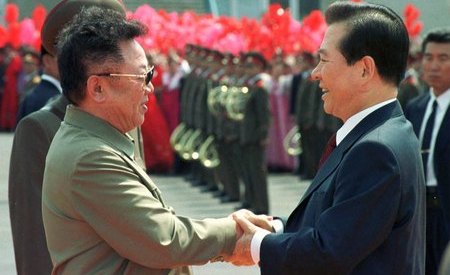
Historic North-South Summit, June 15, 2000,
with DPRK Leader Kim Jong Il (left) and
south Korean President Kim Dae-jung.
The three principles of national reunification we refer to are namely the principles of independent, peaceful reunification and great national unity.
The three principles of national reunification serve both north and south Korea as a foundation for all previous agreements and declarations between the north and the south and a cornerstone for reunification based on system coexistence. When our nation propels reunification in accordance with the Three Principles of National Reunification, there is no need to pick the brains of others for our reunification formula or to beg for the approval of outside forces, but to choose coexistence based on the great national unity instead of a war which will result from confrontation.
The current south Korean authorities should highly respect and value the three principles of national reunification, along with the other inter-Korean agreements.
Nothing is impossible if our nation joins in efforts together.
When we resolve all inter-Korean relations on the basis of the reunification charter and the great program of the whole nation, the reunification issue can be addressed fairly and smoothly in conformity with the common interests of the nation.
Korean Reunification Through Coexistence of Systems and
Its Positive Impact on Northeast Asia
The north and the south agreed on the ways to improve inter-Korean relations and the reunification formula in the June 15 Joint Declaration and the October 4 Declaration. They are, in a nutshell, improving the inter-Korean relations and achieving national reunification peacefully while leaving the two different systems intact. When the north and the south resolve the reunification issue according to this formula, it will promote regional peace and stability by turning the Korean peninsula, the hot-spot of Northeast Asia, into a buffer zone.
 Sea of reunification flags at May 1, 2007 celebration in Seoul. |
From a politico-military aspect, it has been rigidly presented that only when the armistice is terminated and a peace mechanism established on the Korean peninsula, can the hostilities be ended and reunification achieved. However, if reunification through the coexistence of systems is promoted by the north and the south, armistice and hostility will naturally lose ground and a peaceful environment will follow.
Reunification through the coexistence of systems inevitably gives birth to a neutral state. Guaranteeing the neutral position of neighbouring countries will cause the confrontational security structure to disintegrate into one that promises peace in Northeast Asia.
In terms of the economic aspect, this formation will create tremendous benefits not only for the Korean peninsula, but also for Northeast Asia as a whole.
Many bilateral and multilateral economic cooperation projects can be found region-wide. They are initiatives aimed at connecting railways, roads, gas pipelines, electric power networks and energy development, natural resources, sea ports, special economic zones and environmental cooperation. Of course these initiatives require stable development of the inter-Korean relations on the Korean peninsula. Therefore, promoting peaceful reunification through the coexistence of systems agreed to by both the north and the south of Korea will satisfy the demands for regional cooperation so that the peninsula and the region will achieve a flying start at prosperity for all. It will further serve to make the member states of other regions, including Europe, look at opportunities for economic cooperation around the Korean peninsula.
Consequently, the smooth resolution of the reunification issue according to the formula agreed to by the north and the south is a well-balanced resolution that favours a peaceful environment on the Korean peninsula and in Northeast Asia, so as to push and enlarge regional economic cooperation.
These points prove the validity of the ideas for reunification clarified by First Chairman Kim Jong Un of the National Defence Commission of the DPRK in his 2015 New Year's address. He stated that the north and the south should refrain from seeking a confrontation of systems by absolutizing their ideology and system and instead resolve the reunification issue in the common interests of the nation by transcending the differences in ideology in the way they have already agreed.
Reunification through the coexistence of systems is the only way to resolve the Korean issue peacefully and reasonably. When this is realized, the world will give its blessing and credit the wisdom and dignity of the Korean nation.
(February 2, 2015. Slightly edited for grammar and style by TML.)
North Korean UN Diplomats Challenge U.S. Government's Hostile Policy Against the DPRK
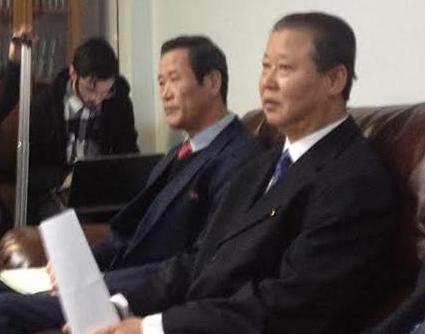 DPRK Ambassador to UN Jang Il Hun (right) at February 16, 2015 press conference. |
On Monday, February 16, North Korea's Ambassador to the UN, Jang Il Hun, held a press conference with several journalists who cover the UN. It was a holiday in New York and the UN headquarters buildings were closed for the American President's Day. The press conference was held at the Democratic People's Republic of Korea (DPRK) Mission to the United Nations in New York. At the press conference the Ambassador explained that not only was February 16 a holiday in the US in honor of American presidents but it was also the date that his country celebrates the birthday of their great leader Kim Jong Il.
The Ambassador said that the press conference had been called to make public the positions of the DPRK on the so-called "Conference on North Korean Human Rights: the Road Ahead," to be held the next day in Washington by the governments of the U.S. and South Korea. He explained that this conference was part of the U.S. government's hostile policy toward the DPRK, a political policy that the U.S. had pursued for almost 70 years since the division of Korea. The U.S., he pointed out, was responsible for the division of Korea.
The Washington conference was intended to mark the first year anniversary of the United Nations Human Rights Council's Commission of Inquiry (COI) Report, a report Ambassador Jang said was fabricated, based on false testimony of witnesses, many of whom remained anonymous.
Ambassador Jang said that the DPRK had complained about the conference to the U.S. government and asked that the U.S. cancel it. This request had been made through the contact in the U.S. State Department, which is the channel for communication between the DPRK and the U.S. The U.S. and DPRK do not have formal diplomatic relations. In the event that the U.S. refused to cancel the conference, Ambassador Jang explained that DPRK asked to "take part in the conference as the party concerned."
The response from the U.S. government, reported Ambassador Jang, was that the conference was being held by private organizations and as it was not a government event, the U.S. government could not cancel it. Nor was it possible for the U.S. government to invite the DPRK to attend. Ambassador Jang reminded journalists that the US government had held a conference during the Opening of the UN General Assembly which took place this past September. When the DPRK requested to attend, the U.S. government refused the request.[1] Hence to claim that the U.S. government was not responsible for denying the DPRK the right to attend a conference about DPRK Human Rights that the U.S. government held was clearly a false claim.
The Washington conference was held on February 17 at the Center for Strategic and International Studies (CSIS). An article in the Korea Times newspaper on February 10 had reported that "South Korea and the United States" would "host a conference on Feb. 17 in commemoration of the first anniversary of the U.N. Commission of Inquiry (COI) report on North Korea's state-perpetrated human rights violations." The article explained that Seoul's Yonsei Center for Human Liberty along with three other think tanks and human rights institutions in the U.S. would organize the conference.[2] Given that a number of speakers at the conference were current or previous government officials, and the role that several of the speakers played in promoting a hostile policy toward the DPRK on behalf of the U.S., South Korean or other similar government entities, US government claims that the meeting was not sponsored by government entities could only raise serious questions about the accuracy of such a claim. Clearly the conference was supported by the US government, and speakers with a record of hostility toward the DPRK and tacit or vocal support for regime change were, it appeared, those who were included in the program.
The agenda of the program was devoid of speakers with diverse views on what would be an appropriate course of action toward building friendly relations between the U.S. and the DPRK. While it was noted that the DPRK had sought to negotiate over the human rights issue before the UN General Assembly resolution on the issue had been passed in December, one could only wonder how negotiation had been rejected, yet the parties involved in the conference claimed they sought to improve the human rights situation in the DPRK.
Notable was the fact that by rejecting any U.S. government policy of negotiation with the DPRK, speakers at the conference appeared to be intent on seeking not improvement of human rights in the DPRK but regime change. Discussing how to use UN channels and processes to bring about this end, however is contrary to the obligations of the charter of the UN. Thus language used in several of the talks at the conference substituted the threat of referral of officials of the DPRK to the International Criminal Court (ICC) as the weapon in place of overt discussion of regime change.
On December 22, the UN Assistant Secretary-General for Human Rights Ivan Šimonović had held a stakeout for journalists after he had presented a report to the UN Security Council about alleged human rights abuses by the DPRK. At the stakeout a journalist asked if Mr. Šimonović had confidence in the evidence against the DPRK. His response was that this was an area where he had "mixed feelings." That the COI report was not "what can be used in a court of law."[3]
One focus of those pursuing a hostile policy against the DPRK is the creation of an office sponsored by the UN in Seoul, South Korea to gather so-called evidence against the DPRK.
The claims against the DPRK, many of which are based on so-called anonymous witnesses, have raised serious questions about reliability. One of the most publicized stories by a defector who has been public in his accusations against the DPRK, has been acknowledged by the defector to be a false story.
In January, Shin Dong-hyuk acknowledged that he had falsified a number of claims that he had made about his experiences in the DPRK. These claims about the DPRK were the subject of a book by Blaine Harden which has been widely promoted and translated into a number of different languages. Harden acknowledges the central role that Shin played in promoting human rights complaints about the DPRK. Harden writes[4]:
"Shin had become the single most famous witness to North Korea's cruelty to its own people. He posed for photographs with the American secretary of state, received numerous human rights awards, and traveled the world to appear on television news programs like 60 Minutes. His story helped launch an unprecedented United Nations inquiry that accused North Korea's leaders of crimes against humanity."
After Shin Dong-hyuk acknowledged that he gave false testimony, the DPRK sent a letter to the UN Secretary General and the Security Council to draw their attention to this development.
The letter from the DPRK referring to this acknowledgement by Sin Tong Hyok (aka Shin Dong-hyuk), explained[5]:
"[I]t cannot be overlooked that John Kerry, U.S. Secretary of State and other American politicians, not content with resorting to their desperate anti-DPRK policy, have misled the world public sentiment and cheated the international community with scandalous misinformation by bringing Sin Tong Hyok to make a false testimony in the anti-DPRK 'human rights campaign' although they were well aware of his true nature."
"This reminds the international community of the fact that Colin Powell, former US Secretary of State made a lengthy lie on the 'possession of weapons of mass destruction' by the Saddam Hussein regime at the Security Council meeting on 5 February 2003 in order to make an excuse and condition for invasion of Iraq."
"Since the report of the COI was proved to be a fraudulent document fabricated by false testimonies of liars like Sin Tong Hyok, it is needless to say, (that) all the 'resolutions' on the situation of human rights in the Democratic People's Republic of Korea forcibly adopted by the General Assembly on the basis of such false documents are invalid."
"I strongly request that the United Nations should take an impartial and fair stand, being well aware that the anti-DPRK 'human rights campaigns' pursued by the United States and others are utterly irrelevant to the protection of genuine human rights, rather [they are] dangerous moves to tarnish the image of the Democratic People's Republic of Korea and find a pretext to invade it."
In contrast to the kind of hostile North Korean program held on February 17 in Washington, is a program held by the Asia Society in New York in July of 2013, titled "Avoiding Apocalypse: Searching for Peace with North Korea." The speakers at this program discussed the importance of building a dialogue between the U.S. government and the North Korean government.[6] In the program, former Governor of New Mexico Bill Richardson and Ambassador Donald Gregg, former U.S. Ambassador to the Republic of Korea raised the question: "How does the U.S. government improve the relationship between itself and North Korea?"
They pointed out the problem created by the hostile relationship fostered by U.S. policy and called for creative thinking to change the situation. "Whether that be the appointment of a special envoy, or something else to be done by the UN, or something by the media, some kind of thinking has to evolve," Governor Richardson explained. The Washington conference that the DPRK has critiqued is but a continuation of the kinds of actions that have stymied the development of a friendly relationship that will foster peace. The need to foster friendly relationships between states, however, is mandated by the UN Charter and is the obligation of the member nations of the UN.
Notes
1. Ronda Hauben, "Information Warfare at the United Nations, Humanitarian Concerns or Geopolitical Power Play?"
http://blogs.taz.de/netizenblog/2014/12/31/information-warfare-at-the-un/
"On Sept 23, 2014 the U.S. Secretary of State John Kerry held a meeting near UN headquarters in NYC helping to set in motion UN actions to condemn the Democratic People's Republic of Korea (DPRK), commonly referred to as North Korea, for alleged human rights violations.
The subject of the meeting was allegedly a UN Human Rights Commission of Inquiry (COI) Report claiming human rights abuses in North Korea. The North Korean Foreign Minister who was attending the opening session of the 2014-5 General Assembly and his delegation were not allowed into this U.S. sponsored meeting about North Korea."
2. Yi Whan-woo, "N. Korean human rights conference due in U.S.," Korea Times, February 10, 2015
http://koreatimes.co.kr/www/news/nation/2015/02/113_173399.html
3. Ivan Šimonović on the situation of Human Rights in the Democratic People's Republic of Korea -- Security Council Media Stakeout (22 December 2014)
http://m.webtv.un.org/watch/ivan-Šimonović-on-the-situation-of-human-rights-the-democratic-peoples-republic-of-korea-security-council-media-stakeout-22-december2014/3957338562001
Following is a transcript of the question asked by (a) journalist at the stakeout about Mr Šimonović's confidence that the conclusions and findings of the COI Report are sufficiently corroborated by other evidence and Mr Šimonović's response.
Q: "Are you satisfied that the conclusions and findings in the Commission of Inquiry are sufficiently corroborated not only by the statements of the defectors but by other evidence of documentary and visual nature from satellites?
"And do you agree mostly from your visits to other countries and examining the records of human rights records with the conclusions of the commission that the abuses in North Korea are unparalleled."
Mr Šimonović's response: "Well, here I would like to share with you my mixed feelings. I do think that it is really good to have solid evidence of crimes against humanity being perpetuated. On the other hand we have to be fully aware that this threshold used for [the] Commission of Inquiry is not the threshold for evidence that can be submitted in the court of law.
"There is plenty to do in further collection of documents and in further collection of other forms of evidence. We think its highly important to have those other things collected to ensure that there is accountability when there will be an opportunity to implement it in real life."
4. Blaine Harden, http://www.blaineharden.com/
5. JA Song Nam, Ambassador, Democratic People's Republic of Korea, Press Release, 21 January 2015, Letter Sent to UN Secretary General and UN Security Council.
6. Ronda Hauben, Out of the Box Diplomacy to Build a Dialogue with North Korea, July 15, 2013.
http://blogs.taz.de/netizenblog/2013/07/15/out-of-the-box-diplomacy-to-build-a-dialogue-with-north-korea/
See also http://asiasociety.org/video/policy/searching-peace-north-korea-complete
(blogs.taz.de/netizenblog, February 23, 2015)
Dangers
Posed by U.S. Presence in Japan
Japan Stands at Crossroads

Chinese-Americans in Chicago protest Japanese Prime Minister Shinzo Abe's visits to the Yasukuni shrine to venerate Japanese war criminals, January 9, 2014.
As the world prepares to commemorate the 70th anniversary of the end of World War II, Japan finds itself at a crossroads: maintain a pacifist stance or revive militarism?
Concerns over Japan's intentions have sprung up like mushrooms all across East and Southeast Asia, as the Japanese government appears ready to challenge the international order established after the war.
Since 2012, it has been one act of provocation after another. The Japanese prime minister's visit to the Yasukuni Shrine, a spiritual symbol of Japan's aggression which honors war criminals, sent shivers across the region.
In July, his administration endorsed a fundamental reinterpretation of the pacifist Constitution, proposing a right to collective self-defense, ambiguously rebranded as "proactive pacifism."
 Japanese workers demonstrate for better wages and working conditions, and for the government to uphold the pacifist Article 9 of the Constitution, Tokyo, March 4, 2015. |
If the Diet, Japan's parliament, approves the revision, the country's Self-Defense Forces will be allowed to send soldiers into battle on foreign soil, striking fear into the hearts of those with direct experience of Japan's previous overseas military escapades.
Similarly alarming is Japan's rising military expenditure. The cabinet has this year approved a record annual defense budget of just under 5 trillion yen (over 40 billion U.S. dollars).
Not content to merely boost military spending, the government and right-wing press have intensified their propaganda campaign to redact the history of the war. The Japanese government still refuses to admit the nature, let alone the scale, of its crimes during WWII.
One of Japan's five national newspapers, the Sankei Shimbun, has even carried so-called testimonies of veterans denying their heinous atrocities, with one headline reading that Nanjing in December 1937 was an "empty city with no army or residents." In fact Nanjing was a city where more than 300,000 people were murdered by the invaders.
In the decades following WWII, Japan earned the respect of the world as a peace-loving nation, and its tremendous economic contribution to the United Nations is globally recognized. If the current government continues to stack up threats to regional security, this international goodwill, accumulated by generations of Japanese leaders, will be dust in the wind.
The Japanese government should be reasonable regarding security policy. Let us not forget that the war Japan launched and lost was also disastrous for its own citizens, millions of whom were killed.
Adopting a responsible attitude to history would help the Japanese government weigh its current policy and its future, in the perspective of the whole of Asia.
 Earlier this month,
President Park Geun-hye of the Republic of Korea
urged Japan to be courageous and sincere in its treatment of history.
The 50
years that have passed since Seoul and Tokyo forged diplomatic ties
should
have made Japan a more mature partner, she said. There should be no
discrepancies in a shared history.
Earlier this month,
President Park Geun-hye of the Republic of Korea
urged Japan to be courageous and sincere in its treatment of history.
The 50
years that have passed since Seoul and Tokyo forged diplomatic ties
should
have made Japan a more mature partner, she said. There should be no
discrepancies in a shared history.
As the Chinese economy heads toward a service-orientated economy, more focused on high-end manufacturing, many trading partners stand to benefit, not least Japan.
More importantly, friendly exchanges between China and Japan are the mainstay of relations which span more than 2,000 years. Last year, more than 2.4 million Chinese tourists visited Japan, a very substantial increase from previous years. In November, the two agreed to resume political, diplomatic and security dialogues.
Now is the perfect time for Japan to improve relations with China, but this can only take place in (an) ambience without fear, on a road of peaceful development.
The choice is down to Japan: Will the nation opt, as Chinese Foreign Minister Wang Yi put it on Sunday, to honestly bear "the burden of history," or will the denial continue?
(Photos/graphics: Xinhua, Japan Press Weekly, China Daily)
U.S. and Japanese Militarism on the Rise

The Japanese Cabinet recently approved a $51.242 billion military budget for the 2015 fiscal year. With the 2 per cent increase over last year, the amount represents the largest annual military spending ever for Japanese imperialism. The military budget for the year includes around $6.6 billion to fund the U.S. military occupation of Japan with the U.S. spending an additional $6.26 billion annually for the occupation. The increase in military spending reflects in part Obama's aggressive pivot to Asia to threaten the Democratic People's Republic of Korea (DPRK) and China and consolidate U.S. imperialism as world dictator.
The Japanese government says the military budget, apart from maintaining troop strength, will be used to purchase sophisticated equipment mainly from Japanese and U.S. military suppliers. This includes outlays for Boeing's troop-carrying Osprey tilt-rotor aircraft, Northrop Grumman's Global Hawk surveillance drones, Lockheed Martin's F-35 stealth fighters, and Kawasaki Heavy Industries' P-1 submarine hunting planes and stealthy Soryu submarine. The 2015 budget also covers the purchasing of parts for Global Hawk drones, planned for deployment in 2019, two additional Aegis radar-equipped destroyers and a missile defence system jointly developed with U.S. imperialism.
Building of warships is a major component of the military budget with purchases coming from Japanese monopolies such as Mitsubishi Heavy Industries (MHI) and IHI Corporation (formerly known as Ishikawajima-Harima Heavy Industries and connected with the Sumitomo group with business arrangements with Kawasaki and Fuji Heavy Industries, Boeing and GE). Japan already has the largest Coast Guard in the world that are mostly military in nature and is equipping its separate navy with modern destroyers and cruisers for deployment abroad.
According to Japan's National Defense Agency, which is the administrative component of the military, the general trend of purchases in recent years has emphasized the development of naval and air weapons systems. For example in 2012, the military spent 16 per cent of its budget on weapons and systems acquisition. Shipbuilding amounted to $1.8-billion, a significant increase from the previous year, which has now been raised again. Warplane purchases for that year totalled $1.36-billion and another $1.03-billion on equipment R&D. These purchases, along with other developments have stimulated the war equipment industry in Japan, within a monopoly capitalist economy that suffers from chronic recurring economic crises.
Japan's War Industry
Apart from increasing its military budget, the Japanese government has enacted two other measures boosting the war industry. In 2008, the government enacted the Basic Act on Space. The new law expanded the focus on science technology and R & D to include "security" in space. The emphasis on ensuring security in outer space has meant the development of space systems to meet the needs of the U.S. military's pivot to Asia and the strengthening of Japan's military capabilities.
This has resulted in greater sales for Japanese military companies such as MHI, which ranks number one in arms' sales to the Defense Ministry. In response to the shift in the government space policy, MHI in 2014 combined its space-related departments with the defence business department. MHI said in a press release that it is seeking to increase space defence sales to more than $5-billion and to expand its other military business. The space and defence domain occupies 27 per cent of MHI sales in Japan. Thus far, the company has no sales in this domain in other countries but this will soon change. An impetus to military sales for leading Japanese arms' companies came with last year's decision of the Japanese government to remove the prohibition on the export of military equipment.
Koga Yoshihiro, professor emeritus of Kaestu University expressed concern with this development saying, "Expansion of arms exports will raise the proportion of military items in production as a whole and will bring about a change in the Japanese industrial structure."
Japan's Shipbuilding Giants Head Toward Rapid Militarization
At the behest of U.S. imperialism and in response to the never-ending recurring economic crises of Japanese monopoly capitalism, the government has accelerated moves to militarize Japan's heavy industry sector and gear it up for military-related orders.
Mitsubishi Heavy Industries (MHI), the shipbuilding giant that built the battleship Musashi during World War II, is in the forefront of this militarization. After the war, under U.S. military occupation, the shipbuilder converted to constructing commercial vessels. In the 1950s, it became the largest shipbuilding corporation in the world. Now, however, the company is again turning itself into a major military manufacturer.
Professor Yoshihiro points out that against the backdrop of MHI's change of course are structural changes in the global shipbuilding market. After converting to commercial shipbuilding, Japanese monopolies such as MHI came into serious conflict and competition in the mid-1980s with south Korean shipbuilding companies and even greater competition in the 2000s with Chinese shipbuilders. Japanese monopolies have been steadily losing their position in the global market.
In the face of this competition, Professor Yoshihiro says Japan's shipbuilders have been increasing their focus on militarization with MHI heading the trend. "Mitsubishi is trying to break through the difficulty by focusing on the construction of state-of-the-art warships, including submarines and Aegis cruisers," he said.
Military construction falls under the rubric of national security and consequently eliminates competitors outside or even targets of the U.S. military occupation of Japan and its pivot to Asia. The Japanese ruling elite consider all Korea, not just the DPRK as a military contender and seek revenge for having been pushed out of its colonial occupations throughout Asia, which were a source of enormous tribute. The Japanese ruling class would not outsource modern weaponry to a Korean or Chinese enterprise.
Of the six Aegis destroyers deployed by Japan's Military, one was built by IHI Corporation and the rest by MHI. MHI is now the largest arms manufacturer in the country. Japan's shipbuilders have persistently urged successive governments to increase national military expenditures as well as lift the ban on arms exports. In 2007, MHI Chair Nishioka Takashi criticized Japan's practice of banning weapons exports, saying that the policy "is hindering the development of Japanese makers' technological capabilities" and is "going against the aim of the Japan-U.S. alliance."
Lifting Arms Export Embargo Is Part of Obama's Pivot to Asia

Protest against Japan's lifting of arms export embargo, near Prime Minister's Abe's office
in Tokyo, April 1, 2014.
The Abe government removed the arms export embargo on April 1, 2014. On the same day, the Japan Business Federation (Keidanren) issued a statement enthusiastically welcoming the policy change. The lifting of the ban allows exports of weapons and military-related technology within the restrictions of the U.S. military occupation. This responds to the demands of the U.S. and Japanese business circles, as the U.S. military occupation of Japan includes financial and industrial integration of military production. For example, the F-35 warplane is jointly produced in both Japan and the U.S., as is the Aegis Combat System and missile defence system.
The decision exposes the hollowness of the so-called "pacifistic spirit of the Japanese Constitution," which Japan and the U.S. parade while jointly engaging in predatory wars, such as the wars against Korea and Vietnam, and threatening nuclear annihilation of the DPRK and China, with the U.S. military acting as the forward spear and Japanese territory and the Japanese military as its main home base and supplier in Asia.
The lifting of the arms export embargo confirms Obama's pivot to Asia is militarist and a deadly serious threat to East Asia and beyond. The change negates what has long been considered a national credo confirmed through a Diet resolution adopted by both Houses in 1981 stating Japan's position as "a peaceful nation in line with the pacifistic idea of the Constitution." The change obliterates the previous hypocrisy of the "pacifist constitution" imposed by the U.S. occupying army by putting the U.S. military occupation of Japan on an openly aggressive wartime footing with Japanese military resources available worldwide.
Under the new policy, the Japanese government approved the export of F-35 fighter jets to Israel, of which Japan takes part in international joint manufacturing. It also allows the export of weapons of mass destruction to not only foreign governments but also international war alliances such as NATO. Under the procedural guidelines, Japan can also provide repair and maintenance services abroad, even in active war zones, for U.S. military aircraft, warships and other weapons. The government is coordinating this change with the move to allow the Japanese military to engage openly in wars abroad. The Japanese military now operates openly throughout the world but under the cover of "counter-piracy" and "peacekeeping" operations. The U.S. military under Obama's pivot to Asia now wants Japanese troops and equipment to join the U.S. in predatory wars and its "War on Terror" worldwide and not just as a reliable home base for wars and intimidation in Asia. The government is pushing this change under the aggressive and convoluted maxim "the right to collective self-defence abroad in order to build a war-capable Japan."
The lifting of the arms export embargo and push to deploy the Japanese military abroad give urgency to the people to fight for an anti-war government that ends the U.S. military occupation of Japan, upholds the principle of sorting out differences with other countries peacefully without force, and to provide Japan with a modern constitution and political mechanisms for democratic renewal, a new direction for the economy and empowerment of the people.
Canadians can play a role in opposition to the rise of U.S. and Japanese militarism by organizing for an anti-war government in Canada that weakens U.S. and Japanese militarism by cutting all Canadian ties with NATO, NORAD, U.S. Northern Command and all other organizations controlled and led by U.S. imperialism.
(Sources: Japan Ministry of Finance, Japan Ministry of Defence FY2015 Budget Request, Japan Press Weekly, Akahata)
Read The Marxist-Leninist Daily
Website: www.cpcml.ca
Email: editor@cpcml.ca
